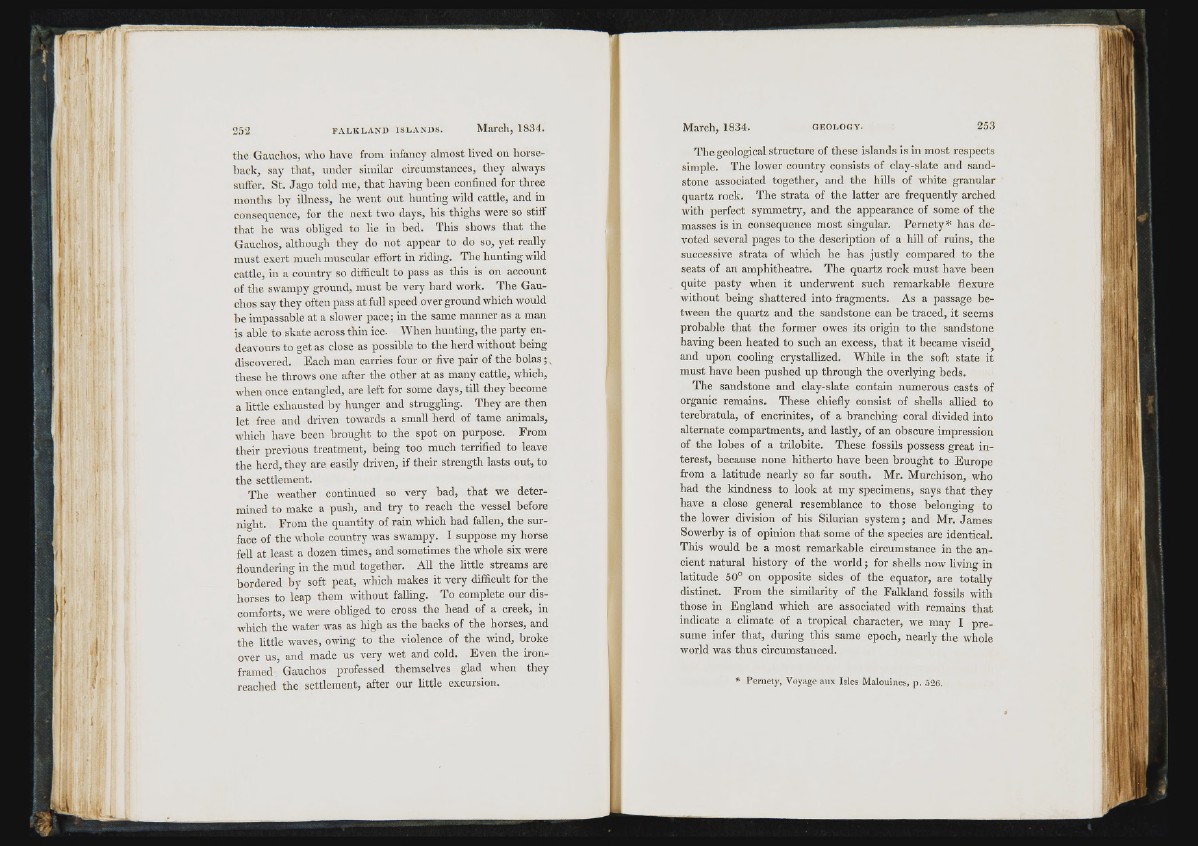
the Gauchos, who have from infancy almost lived on horseback,
say that, under similar circumstances, they always
suffer. St. Jago told me, that having been confined for three
months by illness, he went out hunting wild cattle, and in
consequence, for the next two days, his thighs were so stiff
that he was obliged to lie in bed. This shows that the
Gauchos, although they do not appear to do so, yet really
must exert much muscular effort in riding. The hunting wild
cattle, in a country so difficult to pass as this is on account
of the swampy ground, must be very hard work. The Gauchos
say they often pass at full speed over ground which would
be impassable at a slower pace; in the same manner as a man
is able to skate across thin ice. AATien hunting, the party endeavours
to get as close as possible to the herd without being
discovered. Each man carries four or five pair of the bolas;.
these he throws one after the other at as many cattle, which,
when once entangled, are left for some days, till they become
a little exhausted by hunger and struggling. They are then
let free and driven towards a small herd of tame animals,
which have been brought to the spot on purpose. From
their previous treatment, being too much terrified to leave
the herd, they are easily driven, if their strength lasts out, to
the settlement.
The weather continued so very had, that we determined
to make a push, and try to reach the vessel before
night. From the quantity of rain which had fallen, the surface
of the whole country was swampy. I suppose my horse
fell at least a dozen times, and sometimes the whole six were
floundering in the mud together. All the little streams are
bordered by soft peat, which makes it very difficult for the
horses to leap them without falling. To complete our discomforts,
we were obliged to cross the head of a creek, in
which the water was as high as the backs of the horses, and
the little waves, owing to the violence of the wind, broke
over us, and made us very wet and cold. Even the ironframed
Gauchos professed themselves glad when they
reached the settlement, after our little excursion.
The geological structure of these islands is in most respects
simple. The lower country consists of clay-slate and sandstone
associated together, and the hills of white granular
quartz rock. The strata of the latter are frequently arched
with perfect symmetry, and the appearance of some of the
masses is in consequence most singular. Pernety* has devoted
several pages to the description of a hill of ruins, the
successive strata of which he has justly compared to the
seats of an amphitheatre. The quartz rock must have been
quite pasty when it underwent such remarkable flexure
without being shattered into fragments. As a passage between
the quartz and the sandstone can be traced, it seems
probable that the former owes its origin to the sandstone
having been heated to such an excess, that it became viscid^
and upon cooling crystallized. While in the soft state it
must have been pushed up through the overlying beds.
The sandstone and clay-slate contain numerous casts of
organic remains. These chiefly consist of shells allied to
terebratula, of encrinites, of a branching coral divided into
alternate compartments, and lastly, of an obscure impression
of the lobes of a trilobite. These fossils possess great interest,
because none hitherto have been brought to Europe
from a latitude nearly so far south. Mr. Murchison, who
had the kindness to look at my specimens, says that they
have a close general resemblance to those belonging to
the lower division of his Silurian system; and Mr. James
Sowerby is of opinion that some of the species are identical.
This would be a most remarkable circumstance in the ancient
natural history of the world; for shells now living in
latitude 50° on opposite sides of the equator, are totally
distmct. From the similarity of the Falkland fossils with
those in England which are associated with remains that
indicate a climate of a tropical character, we may I presume
infer that, during this same epoch, nearly the whole
world was thus circumstanced.
* P e rn e ty , Vo y ag e a u x Isle s M a lo u in e s , p . 52fi.
i